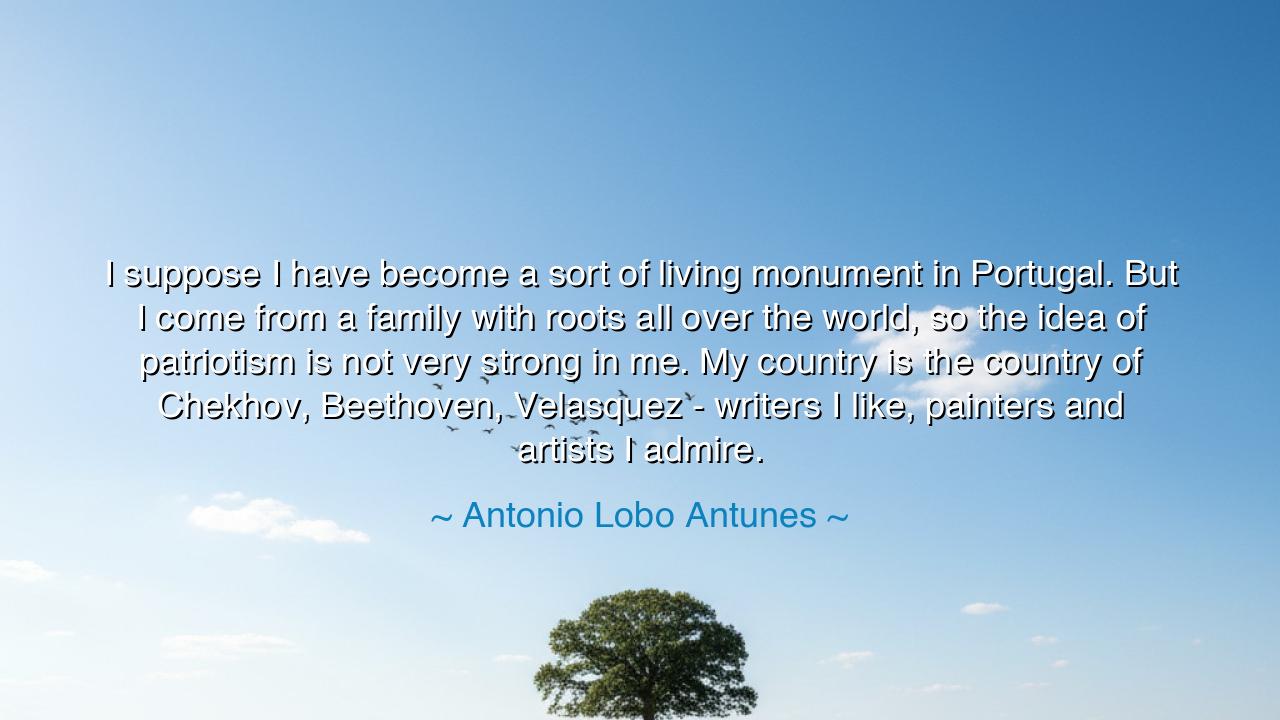
I suppose I have become a sort of living monument in Portugal.
I suppose I have become a sort of living monument in Portugal. But I come from a family with roots all over the world, so the idea of patriotism is not very strong in me. My country is the country of Chekhov, Beethoven, Velasquez - writers I like, painters and artists I admire.






The writer and thinker Antonio Lobo Antunes once reflected: “I suppose I have become a sort of living monument in Portugal. But I come from a family with roots all over the world, so the idea of patriotism is not very strong in me. My country is the country of Chekhov, Beethoven, Velasquez—writers I like, painters and artists I admire.” In these words lies a meditation on the nature of patriotism and the soul’s allegiance. Antunes suggests that love of country need not be rooted in borders, flags, or bloodlines; it may instead arise from the communion with the universal treasures of human culture—art, literature, and music.
In the wisdom of the ancients, the heart of a citizen was not confined to the land of birth. The Stoics taught that the world is one community, and that the soul’s true home is virtue and wisdom. Antunes echoes this universal vision: while he may be celebrated in Portugal, his deepest attachments are not to a single nation-state, but to the shared achievements of humanity. Patriotism, he implies, can be broadened into a love for the cultural and moral wealth of the world, rather than mere territorial loyalty.
History offers resonant examples of this cosmopolitan perspective. Consider Johann Wolfgang von Goethe, who, though a German, drew inspiration from Italian art, French literature, and classical antiquity. His sense of belonging was not confined to his homeland; it was bound to the larger heritage of human creativity. Similarly, Antunes aligns himself with Chekhov, Beethoven, and Velasquez, affirming that his allegiance is to genius, insight, and beauty, rather than to geographic boundaries or political entities. Patriotism, in this sense, becomes intellectual and spiritual, not merely civic.
Antunes’ reflection also challenges conventional notions of loyalty. To be a “living monument” of Portugal might suggest duty to a nation, yet he refuses to equate cultural acclaim with compulsory patriotism. Love of country, he argues, must not be assumed; it is not an automatic inheritance but a conscious, chosen devotion. His perspective elevates the soul’s capacity for judgment, showing that genuine allegiance is ethical, aesthetic, and moral, rather than inherited or coerced.
Consider the story of Albert Einstein, who, though German by birth, identified profoundly with universal scientific principles and humanistic ideals. Einstein often lived in exile and expressed criticism of his homeland, yet his allegiance was to reason, justice, and the progress of humanity. Like Antunes, he demonstrates that loyalty and admiration can transcend borders. Patriotism need not demand uncritical devotion to a nation; it may manifest in commitment to principles that elevate all people.
The deeper meaning of Antunes’ words is that patriotism is not a monolithic sentiment. It may take many forms, including allegiance to ideas, art, and human achievement. A person may honor their country through service and civic engagement, yet also cultivate a broader, cosmopolitan love that connects them to the richness of global culture. Antunes invites us to see that identity can be fluid, layered, and enriched by the treasures of the world beyond one’s homeland.
The lesson for generations is clear: do not mistake nationalism for the totality of loyalty, nor the boundaries of birth for the boundaries of the heart. True devotion is informed, reflective, and enriched by the larger human heritage. Patriotism may coexist with cosmopolitan appreciation, and one can honor a country while recognizing that inspiration, beauty, and virtue are universal gifts.
Practically, this calls each person to cultivate cultural and moral awareness beyond borders. Read widely, study art and music from diverse traditions, and allow the works of humanity to shape your identity and values. Serve your community with awareness of global interconnectedness, and recognize that the principles and beauty you admire elsewhere enhance, rather than diminish, the love of your own home. In doing so, one embodies Antunes’ vision: a patriotism guided by wisdom, enriched by the achievements of all humanity, and not confined to mere geography.






AAdministratorAdministrator
Welcome, honored guests. Please leave a comment, we will respond soon